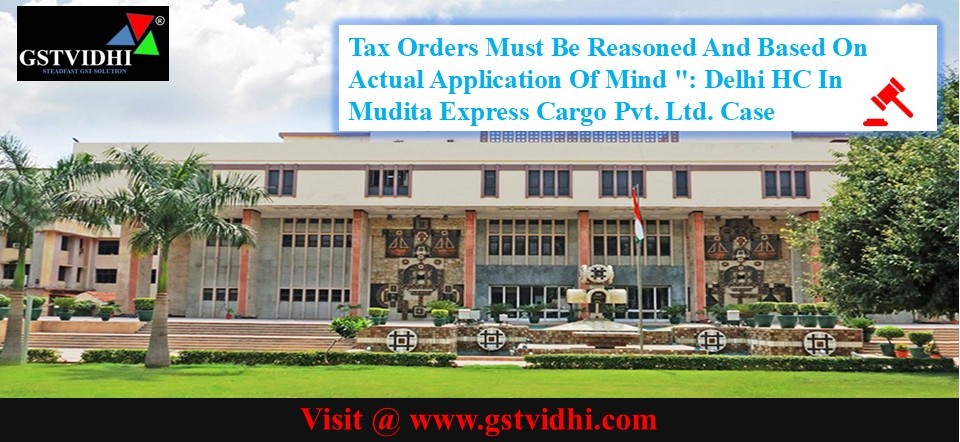
Tax Orders Must Be Reasoned And Based On Actual Application Of
Mind ": Delhi HC In Mudita Express Cargo Pvt. Ltd. Case
Introduction
In a strongly worded
judgment, the Delhi High Court has quashed the penalty and assessment
orders passed against M/s Mudita Express Cargo Pvt. Ltd. under Section
73 of the Central Goods and Services Tax Act, 2017, criticizing the
Department for using template-based orders that showed complete non-application
of mind. The Court reaffirmed that reasoned orders are essential,
especially when taxpayers respond to show cause notices.
Case Details
- Case Title:
Mudita Express Cargo Pvt. Ltd. v. Commissioner of State GST, Delhi
& Others
- Case Number:
W.P. (C) 3078/2025
- Court:
Delhi High Court
- Date of Order:
17 March 2025
Background
of the Case
The petitioner was issued
a Show Cause Notice (SCN) under Section 73 of the CGST/DGST Act for the
tax period April 2019 to March 2020, with a demand summary in DRC-01
dated 24 May 2024. The petitioner initially sought an adjournment but
later filed a written reply on 23 July 2024.
Despite submitting its
response, the petitioner received an order confirming the demand,
wherein the Assistant Commissioner summarily rejected the reply using
boilerplate language:
“The reply filed by the
taxpayer is not comprehensible, conceivable, not perspicuous and is ambiguous…”
The petitioner challenged
this order along with the final demand orders dated 25 August 2024 and 19
December 2024, on the ground that the decision was unreasoned,
pre-decided, and violative of principles of natural justice.
Petitioner's
Submissions
- The impugned order does not deal
with the specific replies submitted by the petitioner.
- The Assistant Commissioner used a
pre-drafted, template-like language in rejecting the response.
- This approach shows complete
non-application of mind.
- The petitioner cited earlier cases
including:
- Indian Highways Management Co. Ltd.
v. Assistant Commissioner & Anr., W.P.(C)
15701/2024
- Xerox India Ltd. v. Assistant
Commissioner, Ward 208, W.P.(C)
16451/2024
— where similar language was struck down as mechanical and legally
unsustainable.
Respondent’s
Argument
- The respondent did not dispute the usage
of identical language across multiple orders.
- A fair stance was taken by suggesting
that the matter may be remanded back, giving the department liberty
to proceed afresh.
Observations
by the Court
The Division Bench
observed:
1. Identical
phraseology was being used repeatedly by the same
officer across multiple cases to reject replies.
2. Such
language — “not comprehensible, conceivable, not perspicuous and is ambiguous”
— has been used like a template, with no application to the facts of
the case.
3. The
Court had already warned against such practice in earlier decisions, yet
the pattern continues.
4. This
clearly violates the principles of natural justice, as the taxpayer's
response was not actually examined.
Judgment
On these grounds, the
High Court held:
“We are of the considered
opinion that the impugned orders dated 25 August 2024 and 19 December 2024 are
liable to be set aside.”
Accordingly:
- The writ petition was allowed.
- The impugned orders were quashed.
- The matter is remitted to the
Assistant Commissioner to decide the case afresh, starting from
the stage of receipt of the taxpayer’s objections.
- All rights and contentions were left
open.
- The petitioner's challenge to Notification
No. 56/2023-CT dated 28 December 2023 was also kept open for future
adjudication.
Legal
Significance
This case adds to a
growing body of jurisprudence emphasizing that:
- Tax orders must be reasoned and based
on actual application of mind.
- Copy-paste templates
or boilerplate language in quasi-judicial orders fail the test
of natural justice.
- Officers exercising powers under
Section 73 must independently examine each taxpayer’s reply.
- Courts are increasingly holding
departments accountable for mechanical, non-speaking orders.
Conclusion
The Delhi High Court’s
judgment in Mudita Express Cargo Pvt. Ltd. reinforces that tax
authorities must act fairly and judiciously, especially when invoking
demand and penalty provisions under the GST regime. This decision is a strong
message against template-based adjudication and a victory for reasoned
decision-making in tax administration.
Disclaimer: All the Information is based on the notification, circular advisory and order issued by the Govt. authority and judgement delivered by the court or the authority information is strictly for educational purposes and on the basis of our best understanding of laws & not binding on anyone.
Find the Attachment (Press on Click Here )
Click here